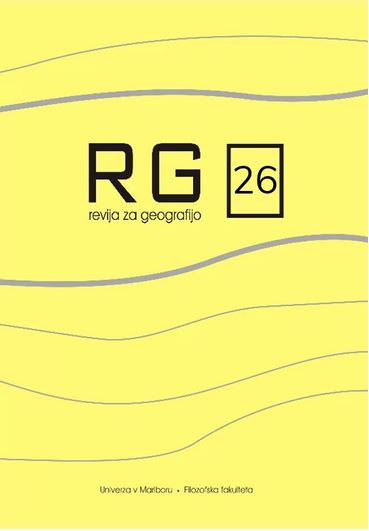Light Pollution in the Pohorje area (ali region)
Abstract
Light pollution as a relatively new form of environmental pollution has been an increasing environmental problem since the 1980s. The source of light pollution in Slovenia is primarily public lighting along roads and cultural or sacral buildings, which are illuminated at night. In the article we were focused on the analysis of the state of light pollution in the Pohorje region, which mainly belongs to the protected area of Natura 2000. We analyzed the situation on the basis of satellite data by considering the night spectral channel. We especially discussed the impact of night skiing in the Mariborsko Pohorje and Rogla ski resorts on the actual state of light pollution. Additionally, we evaluated the effect of selected illuminated buildings in the Pohorje region, which are habitats of bats, on the current state of light pollution in the direct vicinity of these facilities and in their surroundings.
Downloads
References
Arlettaz, R., Godat, S., Meyer, H., 2000: Competition for food by expanding pipistrelle bat populations (Pipistrellus pipistrellus) might contribute to the decline of lesser horseshoe bats (Rhinolophus hipposideros). Biological Conservation, 93: 55-60. http://dx.doi.org/10.1016/S0006-3207(99)00112-3
Jensen, J.R., 2018: Introductory Digital Image Processing. A Remote Sensing Perspective. 4th Edition. Pearson. Hoboken, New Jersey, ZDA.
Marnell, F., Presetnik, P., 2010: Protection of overground roosts for bats (particularly roosts in buildings of cultural heritage importance). EUROBATS report.
Mohar, A., Zagmajster, M., Verovnik, R., Bolta Skaberne, B., 2014: Naravi prijaznejša razsvetljava objektov kulturne dediščine (cerkva) – Priporočila. Društvo Temno nebo Slovenije. Ljubljana.
Rydell, J., 2006: Bats and Their Insect Prey at Streetlights. V: Ecological Consequences of Artificial Night Lighting. Rich, C., Longcore, T. Ur. Island Press. Washington.
Stone, E., Harris, S., Jones, G., 2015: Impacts of artificial lighting on bats: A review of challenges and solutions. Mammalian Biology. 80. 213–219. https://doi.org/10.1016/j.mambio.2015.02.004
Uredba o posebnih varstvenih območjih (območjih Natura 2000). UL RS 49/2004. 30.4.2004.
Žiberna, I., Ivajnšič, D., 2018: Daljinsko zaznavanje svetlobne onesnaženosti v Sloveniji. Revija za geografijo 25. Maribor. https://doi.org/10.18690/rg.13.1.3700
Medmrežje 1: https://www.ngdc.noaa.gov/eog/viirs/download_dnb_composites.html (10.5.2018)
Copyright (c) 2018 Igor Žiberna, Anja Kisilak, Mojca Rajh, Iztok Zagorc, Žan Hozjan

This work is licensed under a Creative Commons Attribution 4.0 International License.
